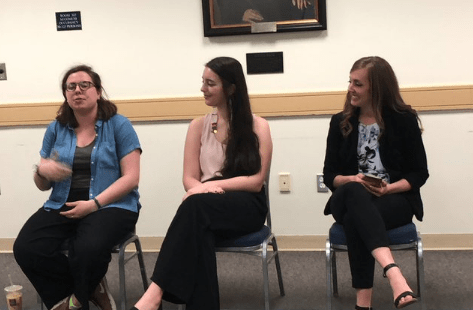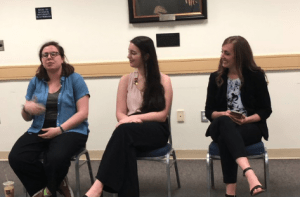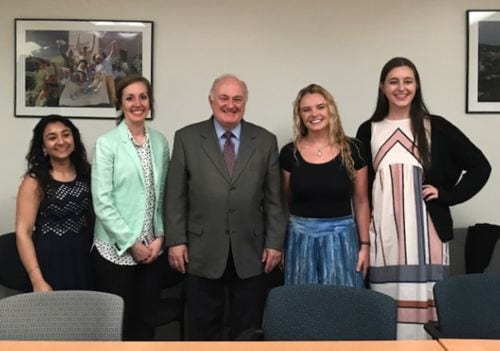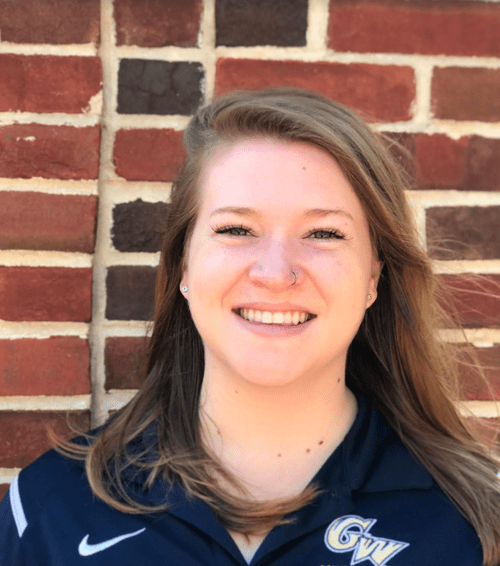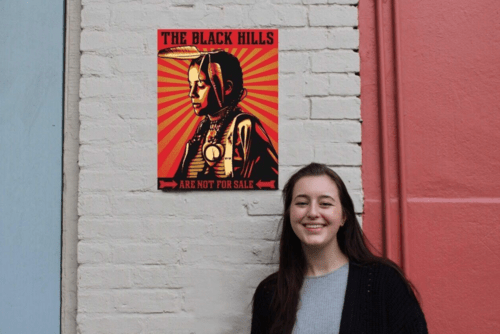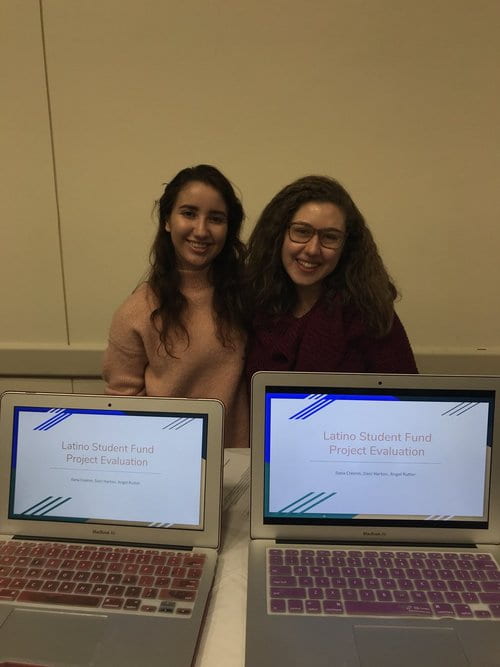As you move forward with course re-design in the COVID-19 era, please continue to plan on creating an opportunity for your students to present their community engaged scholarship projects and reflections at the Symposium. This event, held at the end of every semester, is an opportunity for students to share and learn from each other about important issues in community engagement. This year, students will be invited to participate virtually, by preparing brief (1-2 minute) video or multi-media presentations. These presentations will be due on April 24th, the original date of the planned in-person Symposium, and made available for viewing and comment the week of April 27th. In the coming weeks, we will share platforms, tutorials, and recommendations for creating engaging virtual presentations. As is true for the traditional in-person Symposium, students should be prepared to not only present their own work, but also review and learn from the work of other students.
Category: Student Projects and Reflections
Thank you for joining us for GW’s Fall 2019 Symposium!
Thank you to students, faculty, and community partners who shared their experiences, disseminated their findings, and learned about other campus/community initiatives. ...continue reading "Thank you for joining us for GW’s Fall 2019 Symposium!"
Join us for the Fall 2019 Symposium on Community Engaged Scholarship!
 Join us for GW's Fall 2019 Symposium! The Symposium invites students, faculty, and community partners to share their experiences, disseminate findings, and learn about other campus/community initiatives. A draft of the event schedule is below. For more information about previous Symposiums, please click here.
Join us for GW's Fall 2019 Symposium! The Symposium invites students, faculty, and community partners to share their experiences, disseminate findings, and learn about other campus/community initiatives. A draft of the event schedule is below. For more information about previous Symposiums, please click here.
11:30-12:00pm: Presenter Check-in (Grand Ballroom, 3rd Floor) ...continue reading "Join us for the Fall 2019 Symposium on Community Engaged Scholarship!"
2019 Spring Symposium Brings Community Engaged Students and Faculty together to Share Scholarship
May 10, 2019
Thanks to everyone who attended, presented and supported the Spring 2019 Nashman Symposium on Community Engaged Scholarship!
The symposium brought students and faculty from The Schools of Nursing, Business, Engineering, Education, Medicine, Media and Public Affairs, Columbian College, community partners working with students in courses and members of the GWU community together for an afternoon of community engaged scholarship discussion and dissemination. 75 students presented their work at the symposium showcase using video galleries, posters or laptop presentations to show attendees their research findings in unique ways. Students discussed a wide variety of topics-some presented information on their service site, others showcased community engaged research projects. Many of the student presenters are enrolled in courses designated by the Nashman Center as community engaged https://givepul.se/0xnbhq and their research and service in the community are woven into course objectives.
During lunch participants discussed data from the National Center on Citizenship DC Civic Health Index https://ncoc.org/research-type/2014dcchi/ at their tables with faculty facilitators and challenged each other to think about what kind of neighbors we are when we work with and in the DC community.
The day ended with reflection panels led by students and faculty with discussions on a wide range of issues including sustainability, Knapp Fellowship and Eco-Equity Projects, service with Latinx communities, community service as good business, pathways to service and issues of race and service.
We thank everyone for being part of Community Engaged Scholarship at GWU!
2019 Spring Symposium Brings Community Engaged Students and Faculty together to Share Scholarship
Thanks to everyone who attended, presented and supported the Spring 2019 Nashman Symposium on Community Engaged Scholarship!
The symposium brought students and faculty from The Schools of Nursing, Business, Engineering, Education, Medicine, Media and Public Affairs, Columbian College, community partners working with students in courses and members of the GWU community together for an afternoon of community engaged scholarship discussion and dissemination. 75 students presented their work at the symposium showcase using video galleries, posters or laptop presentations to show attendees their research findings in unique ways. Students discussed a wide variety of topics-some presented information on their service site, others showcased community engaged research projects. Many of the student presenters are enrolled in courses designated by the Nashman Center as community engaged https://givepul.se/0xnbhq and their research and service in the community are woven into course objectives.
During lunch participants discussed data from the National Center on Citizenship DC Civic Health Index https://ncoc.org/research-type/2014dcchi/ at their tables with faculty facilitators and challenged each other to think about what kind of neighbors we are when we work with and in the DC community.
The day ended with reflection panels led by students and faculty with discussions on a wide range of issues including sustainability, Knapp Fellowship and Eco-Equity Projects, service with Latinx communities, community service as good business, pathways to service and issues of race and service.
We thank everyone for being part of Community Engaged Scholarship at GWU!
One Year Later: Knapp Fellow Kristen McInerney
I am drawing connections between their sense of belonging and creating a community of practice
“I am drawing connections between their sense of belonging and creating a community of practice within our school community to help affect their academic achievement.”
Kristen Mclnerney is a Knapp Fellow for the 2018-2019 school year. Her research is on newly arrived immigrant students’ experiences in high school and honoring their voices. She has some big takeaways from her Fellowship year. “I have learned so much this year, including survey development, utilizing quantitative and qualitative methods, and going through the IRB process. It has been a difficult but great year. What first started as just ideas, has started to come to fruition. I still have a lot to do but the research is coming together in a way that I never thought was possible. The Nashman Center connected me with the GW Art Therapy Department to build community connections for the school that I work at and also with Dr. Jordan Potash who has helped create a living mural lesson plan that will help our students and staff create a mural.”
The Knapp Fellowship made Kristen’s ideas possible and she completed a pilot study. “The funds have helped me get study items translated to Amharic, Dari, Spanish, and Arabic for my students and their families. Translation services are very expensive; the Fellowship enabled me to make the IRB and research process accessible in home languages.” Kristen recently presented her preliminary data at the CIES conference in San Francisco in April. She notes that this work will extend into next year, and data from the pilot study, will inform a larger study in the fall, Kristen’s dissertation study. Presenting at the Symposium provides her with the opportunity to receive feedback and connect with other students. She notes, “the opportunity to present at the community Symposium through the Nashman Center provides practice in presenting my data and opportunities to connect with other students and faculty. I even had a few students volunteer to help as research assistants in the Fall. The connection with folks and the questions they ask after they heard my presentation was a great opportunity to get feedback.” McInerney finds her two-year research process very rewarding. “Through the Nashman Center, I’ve connected the community with my school. There are doors being opened now with faith-based organizations and other parts of GW with my school. I’ve learned that our GW and local community is extremely generous and that there are bridges just waiting to be built. It’s absolutely worth taking the time to build those bridges and deepen those connections between the community and our school.”
Kristen has undeniably made great connections in her Knapp Fellowship year to propel her project even further. The Nashman Center is proud of Kristen’s community engaged scholarship!
How to get course credit for attending the Fall 2019 Symposium
December 6, 2019 /
We are glad you’re here and learning about community engaged scholarship.
To get course credit just follow these steps
- Log on to your GW Serves GivePulse Account https://gwserves.givepulse.com
- Click on Classes, click on Fall 2019, click on your class and scroll down to your class wall. https://gwserves.givepulse.com/group/classes/159231?term=Fall+2019
- Post your answers to the prompts that are posted on your class wall your professor can see the answers there and award your credit.
- Don’t forget to click Submit!
See pictures below if you need help! Have a great day at #SymposiumGW and learn about how to extend your Community Engaged Scholarship by following us @NashmanFaculty

How to get course credit for attending the Spring 2019 Symposium
We are glad you’re here and learning about community engaged scholarship.
To get course credit just follow these steps
-
Log on to your GW Serves GivePulse Account https://gwserves.givepulse.com
-
Click on Classes, click on spring 2019, click on your class and scroll down to your class wall. https://gwserves.givepulse.com/group/classes/159231?term=Spring+2019
-
Post your answers to the prompts that are posted on your class wall your professor can see the answers there and award your credit.
-
Don’t forget to click Submit!
See pictures below if you need help! Have a great day at #SymposiumGW and learn about how to extend your Community Engaged Scholarship by following us @NashmanFaculty



Colleen Packard Wins the Nashman Prize
Project: Parent and student knowledge, attitudes, and perceptions of sports injuries and feasibility of expanding athletics activities diversity in a community non-profit organization.
Working in partnership with Beacon House in DC’s Ward 5, Colleen Packard gathered data to assess parent and student perceptions of youth sports, and readiness to expand interest from tackle football to sports with less risk for young athletes.
Colleen Packard was a Masters student in Community-Oriented Primary Care in the Milken Institute School of Public Health.
Read more about her research below, and read more about the Nashman Prize here.
Colleen did research with Beacon House, a non-profit organization located in the Edgewood Commons complex of Washington, DC whose mission is to close the education achievement gap for children in Ward 5. Beacon House’s athletics program is a signature offering of the organization, and the tackle football program is the largest and most successful of the sports offered.
However, with increased awareness of concussion risk in youth sports, Beacon House requested this research be done in order to adequately inform any future action by its administration. The purpose of this study was to conduct an assessment of parent and student perceptions of youth sports injuries. The study also surveyed Beacon House parents and students to see how the athletics program could potentially expand in the future. The mixed-methods study utilized survey measures and focus groups to measure both parent and student knowledge, attitudes, and perceptions of concussions. The athletics interest form furthermore showed which sports parents and students are interested in playing, either in lieu of or in addition to tackle football. All methods were reviewed by Beacon House before beginning data collection, and Beacon House staff were integral to participant recruitment.
Colleen Packard Wins the Nashman Prize
Colleen Packard, a Master’s student pursuing a degree in Master's of Public Health in Community-Oriented Primary Care, has won the Nashman Prize for her Community-Based Participatory Research! Undergraduate and graduate students who present their research at the annual GW Research Days event are invited to submit for consideration for the Nashman Prize, which recognizes excellence in Community-Based Participatory Research.
Read more about her research below, and read more about the Nashman Prize here.

Colleen’s Project: Parent & Student Knowledge, Attitude, and Perceptions of Youth Sports Injuries the Feasibility of Expanding Athletics Activities Diversity in a Community Non-Profit Organization will be presented at the Nashman Symposium on April 26th sign up here to attend https://givepul.se/nrvz0
Colleen did research with Beacon House, a community non-profit organization located in the Edgewood Commons complex of Washington, DC whose mission is to close the education achievement gap for children in Ward 5. Beacon House’s athletics program is a signature offering of the organization, and the tackle football program is the largest and most successful of the sports offered.
However, with increased awareness of concussion risk in youth sports, Beacon House requested this research be done in order to adequately inform any future action by its administration. The purpose of this study is to conduct an assessment of parent and student perceptions of youth sports injuries. The study also surveys Beacon House parents and students to see how the athletics program could potentially expand in the future. The mixed-methods study utilizes survey measures and focus groups to measure both parent and student knowledge, attitudes, and perceptions of concussions. The athletics interest form will furthermore show which sports parents and students are interested in playing, either in lieu of or in addition to tackle football. All methods were reviewed by Beacon House before beginning data collection, and Beacon House staff are integral to participant recruitment.
Learn more at beaconhousedc.org.
One Year Later: Knapp Fellow Gillian Joseph and Find Our Women

Gillian Joseph was one of two winners for the 2018-2019 Knapp Fellowship Award. Her research project, Find Our Women, began with Gillian talking to women who were survivors, and family members of Indigenous women that are missing, murdered or victims of violence. She did this work within her honors thesis research and wanted to find protective factors for these Indigenous women. She began looking at the Dakota Access Pipeline camp, and concluded that decolonizing a space/society is a protective factor for violence against Indigenous women.
To learn more about Gillian’s early phases of the research project, and her inspirations for the project read this article!
After one year of Gillian’s groundbreaking community-based research, she was published in the APA journal through an internship at the American Psychological Association. She focused on Native American issues and met a Native American psychologist, who helped her publish a paper about the intersection of psychology and violence against women. She also has another article under review in the Journal of Indigenous Research .
To read Gillian’s journals click these links:
APA Journal: https://www.apa.org/pi/oema/resources/communique/2018/11/standing-sisters Journal of Indigenous Research: https://digitalcommons.usu.edu/kicjir/
Gillian is creating a non-profit organization, Project Find Our Women, which gives money to Indigenous women to tell stories from their communities that aren’t being seen or heard so that other women can relate, and reach out if they are feeling the same violence or treatment. Learn more about Project Find Our Women here.
Gillian is graduating from GW and will get her master degree through a program called Erasmus Mundus, which is a program through the EU and fully funded. She will focus on cross-cultural psychology. She wants to continue her work and extend it to other Indigenous populations. She also wants to expand her non-profit and tell different stories. Gillian has done excellent work, her progress in a year is just amazing. Nashman is so proud of Gillian, and we're excited to see what her future holds!
Engaged Scholarship: How to Prepare a Showcase Presentation
Each semester the Nashman Center hosts the Symposium on Community Engaged Scholarship, an afternoon for students, faculty, and community partners to share and reflect upon their experiences. During the Showcase Session, student presentations describe the nature of their community engagement during the semester, in terms of:
- the outcomes for the community,
- the outcomes on their own learning and growth, and
- what they believe the general public needs to know about the issue they addressed or the community they worked with.
To prepare a Showcase Session presentation, it is important to keep in mind a few key aspects of the context of this portion of the Symposium.
During this part of the Symposium, the audience flows through presentations much like an art gallery or research day poster session.

You will not have a sit-down audience. People come and go. We advise you to carefully prepare a 1-2 minute “pitch” presentation, which you will give many times. The goal of this pitch is to make your audience want to stay longer to ask follow-up questions and hear more about your project. Spend some time thinking about how to summarize your experience, while highlighting the community impact, what you learned, and what you think it is important for the general public to know about the issues your project addressed.
Leverage visual aids to get audience attention and make your points memorable.

Students use posters, powerpoint slides, handouts, art, or other visual aids to be able to quickly and memorably make their points. In some cases, such as for engineering or interior design courses, students bring the actual product they designed for their community partner.
For students using slides on a laptop: photographs, maps, and graphs have greater impact than bullet points or text. You will need to bring your own laptop, and make sure its battery is fully charged.
Consider ways to engage the audience in active participation.

If your findings are surprising, ask your audience what they think or expect before revealing the results. Take a poll, indicating the results in real time using a poster with tally marks. If there is a way the general public can make a difference on the issue or with the community you worked with, provide information about that (what information can they share with their elected representatives? where can they go to do volunteer service?)
Now Accepting Presentations for the Spring 2018 Service-Learning Symposium

The Community Engaged Scholarship team at the Nashman Center and everyone involved with the planning of this spring's symposium are excited about continuing the discussions we began at this winter's symposium and expanding into new areas of scholarship as well. We look forward to learning together again in May.
This spring's symposium will feature showcase presentations (posters or slides), engaged scholarship panels, course based panels, awards and lunch. The spring symposium will take place on Tuesday, May 1st, 2018, between 12 p.m. and 4 p.m. on the 3rd floor of the Marvin Center.

To register as a presenter in a subject panel, register your course as a panel, or to register individual poster or laptop presentations in this spring's symposium whether you are a faculty member or student please click the link here: https://docs.google.com/forms/d/e/1FAIpQLSdlygWz3LNcGr3i3o1ZclvXSZNJxQIJlNfePrXDleAS80RrCw/viewform
The deadline for all subject panel, course and showcase submissions is April 9th 2018. Due to increased interest in the symposium all students must be present to stand alongside their presentation and discuss it with others in a collaborative manner - no absentee presentations will be accepted. All posters must be able to stand on their own due to space restrictions. See below for where students can purchase tri-fold posters.
Please get this link out to your students early so they can begin to think about what they want to present and get their materials and form in order early on. If students don't have a tri-fold poster to use, one can be found available for purchase here and here.
If faculty or students have community partners, or other GW community members they would like to invite to the symposium they should RSVP to the Symposium at the Evite link here. Below you will find some examples of laptop and poster presentations.



Please contact Rachel Talbert (rachellt@gwu.edu) for more information or any questions.
Fall 2018 Symposium on Community-Engaged Scholarship

This event was held Friday December 7th, Noon - 3:45 pm, Marvin Center, 3rd floor
Link here for the Fall 2018 Symposium program.
Link here for information about the upcoming Spring 2019 Symposium.
Highlights this semester included:
- a lunchtime presentation by students in Dr. Leslie Jacobson’s Theatre for Social Change course, followed by Dr. Jacobson’s facilitated discussion and reflection.
- Over 25 showcase presentations, including:
- Advocacy films created and presented by students in SMPA 4190 Senior Capstone: Online Journalism Workshop (Instructor: Imani M. Cheers). If you missed them: https://monumedia2018.wixsite.com/home
- Undergraduate community engaged MAP-IT projects from HSCI 2195: Applied Health Equity (Instructor: Maranda Ward)
- Research and reflection presentations by students in SOCY 2105 (Instr: Greg Squires), HSCI 2195: Applied Health Equity (Instructor: Maranda Ward), 3100W: Program Planning and Evaluation (Instr: Michelle Kelso), HSSJ 3152: Fact, Field, Fiction (Instr: Emily Morrison), HSSJ 1177 (Instr: Peter Konwerski) & SPAN 3040/ Operacion Impacto (Instr: Dolores Perillian), HSSJ 1100: Introduction to Human Services and Social Justice (Instr: Wendy Wagner), and HSSJ 4198: Citizen Leadership, Civic House Scholars Program (Instr: Wendy Wagner)
- Concurrent Sessions, including panel presentations and reflective discussions:
- Community Engagement through the Arts (facilitated by Aselin Lands, Director of ArtReach GW)
- East of the River: Inequity in DC (facilitated by Maranda Ward, Visiting Professor of Clinical Research and Leadership)
- Partnerships in Youth Development/Education (facilitated by Lottie Baker, Assistant Professor in GSEHD)
- The Sustainability Forum (facilitated by Tara Scully, Assistant Professor of Biology and Director of GW’s Sustainability minor)
- Operación Impacto (facilitated by Dolores Perillán, Instructor, Spanish Literature and Director of Operación Impacto)
- What does MMIW mean? A dialogue about Missing & Murdered Indigenous Women (facilitated by Lisa Benton-Short, Chair of the Geography department). More information available here: https://findourwomen.org/
Credit for Symposium Attendance for your Community Engaged Course
The Nashman Center welcomes students from Community-Engaged Courses who are participating in the Symposium today. To confirm your attendance with your professor, post your reflections on each session you attend to your GWServes course page (instructions below).
1) Go to https://gwserves.givepulse.com/group/classes/159231?term=Fall+2018
2) Scroll down and select your course by clicking on the course title
3) You’ll see your class page
4) Scroll all the way to the bottom of your class page and you’ll see the discussion wall
5) Post your reflections (prompts provided on the next page) and click submit. Your wall posts will be seen by your course instructor and that is how they will verify credit for attendance today.
6) Questions? From GWServes, message your course administrator, Rachel Talbert.
Prompts for response: Please share a few thoughts about each of these sessions today.
1) Lunch Session: After viewing the GW Theatre students’ presentation, what do you think about the role of the arts in social change? Has your service experience ever led you to also do advocacy?
2) Showcase Session: Which showcase presentation was your favorite and why?
3) Panel Session: Which session did you choose? What was discussed that you can connect to what you learned in your community-engaged scholarship course this semester?




